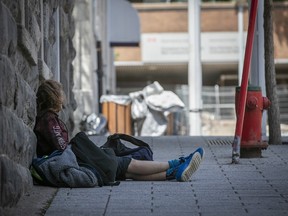A group of Chinatown residents say that despite an increased police presence, they still feel insecure in their neighbourhood.

A group of Chinatown residents say that despite an increased police presence, they still feel insecure in their neighbourhood and elected officials aren’t listening.
The new residents association, which will officially announce its launch on Wednesday, wants to ensure residents are heard and consulted on issues like addressing homelessness, said Fo Niemi, who will act an adviser to the group’s steering committee.
Niemi, whose organization, the Center for Research-Action on Race Relations, has been acting as a resource group for Chinatown merchants and residents, said encampments established by people experiencing homelessness can still be found in the area and some individuals who frequent the neighbourhood have behaved violently.
“There’s still a lot of fear,” he said.
On Tuesday morning, damage from a fire was found on the exterior of a local daycare, he said, adding that just a few days before, a fire was set outside of a home in the area.

“I think residents want to be taken more seriously. They want to be heard, they want to be listened to, they want to be consulted,” Niemi said. “One of the things we’ve heard, not only, by the way, in Chinatown but people in Milton Park, people in the Gay Village, is that the city’s approach to homelessness has been placing too much focus on working with the unhoused population and the community organizations that serve them, but local residents and merchants are not being involved, are not being consulted, and they’re the ones who, in their opinion, bear the brunt of all the negative consequences of ‘the policy of cohabitation.’”
Advocacy by Chinatown residents has built relationships with the police and led to more frequent patrols, but elected officials haven’t been listening to their concerns, Niemi said.
“Despite all the noise people have made since last year, none of the elected officials at the federal, provincial and municipal level have really met with them,” he said.
Around 2,500 people live in Chinatown, he said, a diverse group of residents of different ages, ethnicities and income levels.
He said the association wants to work with local merchants, who face their own challenges — including being in an area that is ineligible for a city program that compensates merchants for the inconvenience of road repairs.
“What’s going on in Chinatown is the reflection of what’s going on for the whole downtown area in terms of public safety, in terms of local democracy and consultation, in terms of public health and more importantly, how all this can affect the economic and cultural vitality of the downtown area,” Niemi said.